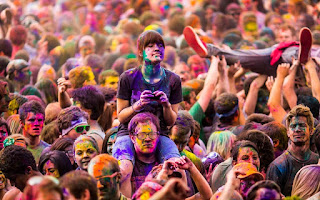Hindu nationalist Prime Minister Narendra Modi cast his vote in India's general election, after making several inflammatory statements during his campaign that were accused of targeting the country's Muslim minority.
Voter turnout was down significantly from the last national election in 2019, which analysts attributed to Modi's widely expected victory for a third term and above-average temperatures heading into the summer.
Modi left a polling station in the city of Ahmedabad in the morning, holding up a finger with clearly visible ink marks on it as he was surrounded by security personnel to the cheers of his supporters.
"In the grand ritual of democracy, all people who contribute deserve to be congratulated," Modi told reporters.
He added: "Once again, I urge Indians ... to come out in large numbers to vote and celebrate the festival of democracy."
The prime minister's ruling Bharatiya Janata Party is expected to win the election handily, but since voting began on April 19, Modi has intensified his rhetoric on India's great religious divide in an effort to win voter support.
He used his speeches to refer to Muslims as "infiltrators" and "those who have more children," drawing condemnation from opposition politicians who filed complaints with election authorities.
Modi also accused the Congress Party, the main rival in the fractured opposition alliance, of plotting to transfer the country's wealth to Muslim families.
"This is the first time in a long time that he has been so direct," said Hartosh Singh Pal, editor-in-chief of the news magazine The Caravan.
He added, "I have never seen him express his fanaticism so directly. Usually he denounces fanaticism."
He added, "His statements on redistribution of wealth are aimed at a part of the Congress Party's manifesto that does not exist, which is frankly unfortunate."
A decade after he came to power, Modi still enjoys widespread popularity, largely because his government has prioritized the country's majority religion in its policies, despite India's officially secular constitution.
"There are no jobs and no economic opportunities. My business has never been so bad," fish vendor Anil Sonkar, 55, told AFP in Agra, home to the Taj Mahal.
"But under this government we feel safe and proud as Hindus," he added.
The construction of the temple fulfilled a key demand of Hindu activists and was celebrated across India with extensive television coverage and street parties.
Modi's Hindu nationalist policies have exacerbated fears among India's more than 220 million Muslims about their future in the country.
Menna Othman, 48, who owns a travel agency in the city of Agra, told AFP: "The government is blatantly practicing sectarian politics.
He added that the result was that every Hindu in India was "suspicious of anyone with a beard.
The Election Commission did not punish Modi for his comments, although its code of conduct prohibits campaigning on "communal sentiments" such as religious issues.
India's elections are being held in seven phases over a six-week period to ease the enormous logistical burden of organizing the democratic process in the world's most populous country.
Most of the South Asian country experienced a heat wave last week as voting took place in high temperatures in several constituencies.
In the city of Mathura, a three-hour drive from New Delhi, temperatures topped 41 degrees Celsius on election day, and Election Commission data showed that voter turnout was down about nine points to 52 percent from five years ago.
But the Indian Meteorological Department predicted another heat wave in May, and the Election Commission formed a task force last month to review the impact of heat and humidity before each round of voting.
Modi told reporters after leaving the polling station that he was encouraging voters to "drink as much water as possible."
"The more water you drink, the more you maintain your health and energy," he said.
Several areas voting Tuesday, including the states of Madhya Pradesh and Bihar, are expected to experience extreme heat.
In Agra, where temperatures reached 42 degrees Celsius in the afternoon, a woman named Taslim Warsi told AFP that her mother had not voted because of the "extreme heat".
Years of scientific research have concluded that climate change is making heat waves more frequent, intense and longer.
More than 968 million people are eligible to vote in India's election, with the final round of voting expected to take place on June 1 and the results announced three days later











0 Comments